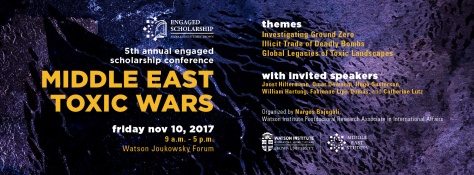ABOUT 2017 | PROGRAM | PEOPLE | LOGISTICS
Middle East Toxic Wars
Organized by Narges Bajoghli, Postdoctoral Research Associate in International Affairs, Watson Institute for International and Public Affairs in collaboration with Middle East Studies. This is Middle East Studies’ fifth Engaged Scholarship Conference.
This conference was made possible by funding from Middle East Studies, the Cogut Institute for the Humanities, the Department of Anthropology, and the Humanitarian Innovation Initiative at Brown University.
About:
The Middle East has been ground zero for the major chemical attacks of the past 40 years. From the Iran-Iraq War (1980-88), to the Persian Gulf War (1991), to the Syrian Civil War (2011-present), countless civilians and soldiers have been exposed to chemical agents and hundreds of thousands of survivors live with the long-term consequences of these bombs. Yet, there has been limited scholarly and public work about chemical warfare and the traces it leaves behind in the region: from its illicit international trade, to the lives of survivors post-exposure, to the environmental disasters these bombs unleash.
Brown University’s Middle East Studies will host the fifth Engaged Scholarship Conference on November 10, 2017, entitled Middle East Toxic Wars. This conference will bring together scholars and filmmakers from around the world to discuss the three main themes of the conference:
-
Investigating Ground Zero: How researchers investigate the immediate aftermath of chemical bombs, provide care for survivors, and gather evidence;
-
Illicit Trade of Deadly Bombs: How researchers and filmmakers can uncover the convoluted paths of production, circulation, and use of chemical bombs; and,
-
Global Legacies of Toxic Landscapes: How scholars and filmmakers unearth the long-term environmental effects of chemical warfare and the ways they impact future generations. And, how scholars of the Middle East can learn from those who work to raise awareness and further scholarship about the deadly impact of toxins in other areas of the world.

